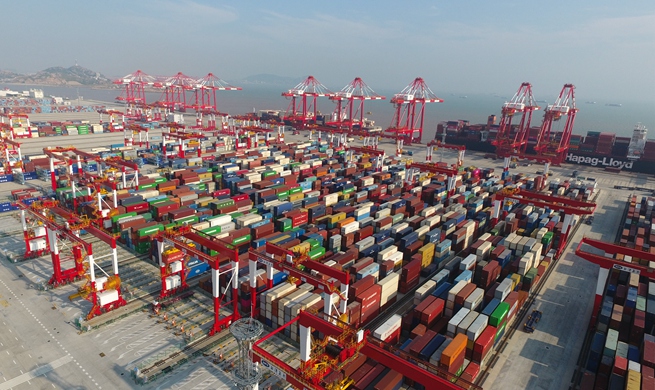SEOUL, Aug. 7 (Xinhua) -- South Korean Minister of Economy and Finance Hong Nam-ki vowed on Wednesday to take rapid and bold steps to tackle an increased volatility in the financial market.
Hong, who also serves as deputy prime minister for economic affairs, made the remarks during an emergency meeting with the chiefs of the central bank, the financial regulator and the financial watchdog.
"The recently increased volatility in the financial market resulted from internal and external risk factors, overlapped in the short period of time ... (The government) will rapidly and boldly deal with them through all available measures," Hong said.
The minister cited stock market stabilization measures, eased regulations on buybacks and tightened rules on stock short-selling as the available measures.
Hong said global stocks weakened overall on the back of the global trade dispute, worries about the global economic slowdown and uncertainties over the U.S. interest rate cut.
Hit by the worsened external conditions, South Korea's export reduced for the eighth straight month in July, leading to the corporate investment slump and the poor corporate earnings, Hong noted.
Adding to the uncertainties, Japan removed South Korea last week from its whitelist of trusted trading partners that are given preferential export treatment.
Hong vowed to take bold and preemptive steps if excessive moves occur in the financial market, saying the financial authorities will pay a special attention to the volatility in the foreign exchange market.
The emergency meeting came as volatility surged this week in the financial market, driving local stocks and currency to the lowest in more than three years.
Helped by the verbal indication of intervention in the financial market, the South Korean currency closed at 1,214.9 won versus the U.S. dollar Wednesday, up 0.4 won from the previous close.
The benchmark Kospi index ended 0.41 percent lower amid the lingering worries about the trade rows, after moving in the positive territory in early trading.
The financial authorities sold 187 million U.S. dollars in the foreign exchange market in the second half of last year for the FX market stabilization, according to the Bank of Korea (BOK) data.
The South Korean government issued 1.5 billion U.S. dollars of sovereign bonds in June, and Moody's kept its rating on South Korea at "Aa2," the third-highest level on the sovereign rating table, with a "stable" rating outlook in July.
The country's foreign currency reserves reached 403.1 billion U.S. dollars as of end-July, becoming the world's ninth-biggest foreign reserves holder.
BOK Governor Lee Ju-yeol told reporters after the emergency meeting that the central bank, if necessary, can review the monetary policy response according to the situation's change.
Lee noted that the BOK needed to see what will happen, indicating no further rate cut in the near future.
The BOK lowered its benchmark interest rate by 25 basis points to 1.50 percent in July to help address the economic slump.
The government planned to spend more than 75 percent of the supplementary budget by the end of next month in a bid to deal with Japan's export restrictions.
Financial Services Commission (FSC) Chairman Choi Jong-ku told reporters after the meeting that the tightening of rules on stock short-selling had been reviewed sufficiently and could be implemented "at any time."
South Korea banned the short-selling in October 2008 amid the stock market volatility, caused by the global financial crisis. The ban on short-selling of financial stocks was lifted in November 2013.













